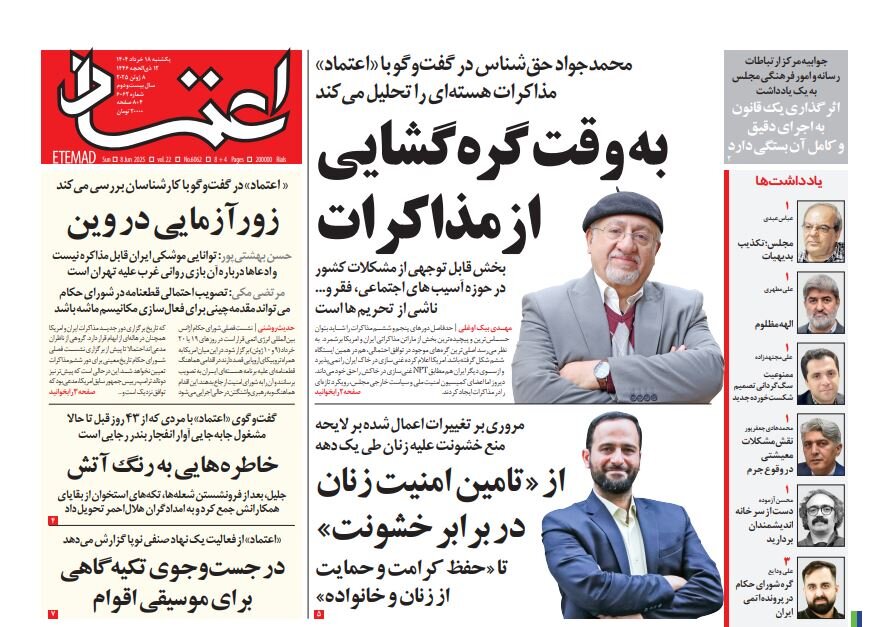America uses Europe as leverage to gain concessions from Iran

TEHRAN - In an interview with Abolghasem Delfi, the former Iranian ambassador to Paris, Etemad examined the destructive and coordinated actions between Washington and the European troika to approve an anti-Iran resolution at the IAEA Board of Governors.
He said: During the past five rounds of negotiations, several specific features have emerged. The first point is related to the composition of the negotiating actors. The Trump administration is inclined to consult only with Iranian representatives and to exclude other actors, especially the Europeans. This is while Europe has tools at its disposal that it can use in the negotiation process to influence them. Washington does not want Europe to enter new negotiations directly. The Americans' goal is to use all available tools, including European leverage, to pressure Iran and gain concessions at the negotiating table. The important point is that we should not consider Europe an absolute enemy. Europe is the only party that can activate the snapback mechanism against Iran in the current situation. Therefore, a tense confrontation with this group of actors is not in our interest. If regional capacities, economic relations, and diplomacy are used effectively, we can have the upper hand in negotiations.
Iran: Depth of Iran's intelligence penetration inside Israel
In a commentary, the Iran newspaper discussed the Islamic Republic’s heavy intelligence blow to the Zionist regime's security services. It wrote: In the process of confrontation that has been going on for years between Tehran and Tel Aviv, this time the issue is related to the confrontation in the intelligence field; from the think tanks and analysis rooms of the Israeli security institutions, which are once again sounding the alarm for themselves with each new espionage case these days. As in the past year, the Israeli intelligence services were forced to admit a bitter reality, namely that in just 12 months, at least 20 espionage cases related to Iran were filed inside the occupied territories. What at first glance appears to be a collection of cases has a different face in the analysis of Israeli security institutions, because despite the differences in details, the behavioral pattern of the perpetrators, the recruitment plan, and even the target society of the Iranian intelligence services, it has taken on a repetitive and systematic form. The regime's internal security service (Shin Bet) reports a continuous increase in such cases. But what the media and official authorities try to make appear small and insignificant is a more worrying issue for Israeli security experts.
Arman-e-Emrooz: A major transformation in West Asia
In an analysis, Arman-e-Emrooz discussed the significant turn in Riyadh’s policies and wrote: The restored relations between Iran and Saudi Arabia have changed the regional dynamics. Riyadh, in a complete turnaround from its previous positions, has expressed its willingness to facilitate a new nuclear agreement between Iran and the United States. Israeli attacks on Hamas and Hezbollah and the fall of Bashar al-Assad’s government in Syria have also been influential factors. Saudi Arabia has made establishing relations with Tehran a less risky option for itself. The next factor is the emergence of Israel as a potential hegemonic force in the region. Israeli military operations have made Saudi leaders wary. Saudi leaders now see Iran as a balancing factor. This new strategic calculation has caused Riyadh to quietly oppose military attacks on Iran, because Iran, from the Saudi viewpoint, is a necessary factor for maintaining a multipolar balance in the Middle East.
Ettelaat: Will a possible Iran-U.S. agreement collapse in the future?
Despite the resumption of negotiations between Iran and the United States, the crisis of trust between the two sides remains one of the central challenges to Iran's foreign policy. The experience of the breakdown of the JCPOA and Europe's inability to offset the effects of sanctions has made Iran skeptical of the West's adherence to international obligations. This mutual distrust has made negotiations largely tactical, temporary, and fragile, preventing the formation of a stable framework for long-term cooperation. In such a situation, even if a new agreement is reached, the possibility of its collapse is high due to changes in government or unpredictable developments. Pressure from regional lobbies in Washington, such as Israel and some Arab countries, and the role of Congress in obstructing the path to lifting the sanctions have made it more difficult to reach a durable and reliable agreement. In this way, the crisis of trust with the West will not only be a technical obstacle to negotiations but also a strategic challenge for the future of Iranian diplomacy, which could keep foreign policy in balance between the two strategies of "maximum resistance and conditional negotiation."
